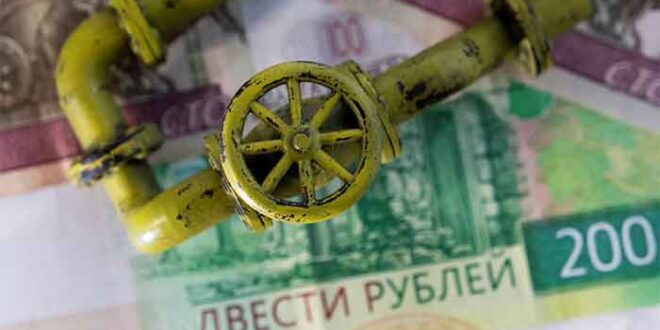The euro plummeted to a five-year low against the US dollar during Wednesday’s trading, amid heightened fears of a possible energy crisis and an economic slowdown in Europe.
Media reports from Europe said:
As of 11:01am GMT, the euro/dollar exchange rate was down to $1.061 from the previous closing level of $1.0636. Earlier in the day’s trading, the index fell to $1.0586, dropping below $1.06 for the first time since April 2017.
The euro weakened further after Russian energy giant Gazprom cut off gas supplies to Poland and Bulgaria over their refusal to pay in rubles, leading to uncertainty about the bloc’s energy security.
In March, Russian President Vladimir Putin announced that payments for natural gas supplies to the European Union and other countries that had imposed sanctions on Russia, were to be made in the Russian currency. The new payment mechanism has now been implemented, the Kremlin announced on Tuesday.
Rouble Vs Euro In Moscow
A Reuters report said on April 27, 2022:
The rouble soared to a more than two-year high against the euro in Moscow trade on Wednesday, supported by existing capital controls and upcoming income tax payments, after Russia upped the ante in a gas dispute with Europe.
Russia halted gas supplies to Bulgaria and Poland for rejecting its demand for payment in roubles, taking direct aim at European economies in its toughest retaliation so far against international sanctions over Moscow’s actions in Ukraine.
By 1418 GMT, the rouble had gained 1.8% to trade at 75.43 versus the euro, its strongest since early March 2020.
It was 1.1% stronger against the dollar at 72.75.
The suspension of gas supplies to a number of European countries could exacerbate geopolitical tensions and further worsen relations with Europe, negatively impacting sentiment, Veles Capital said in a note.
Promsvyazbank analysts said corporate income taxes due on Thursday could deter the greenback from strengthening significantly against the rouble.
The market is also looking ahead to Friday’s rate decision. The central bank is widely expected to cut its key interest rate by 200 basis points to 15% as it tries to stimulate more lending in the economy in the face of high inflation, a Reuters poll showed.
Lower rates support the economy through cheaper lending but can also fan inflation and make the rouble more vulnerable to external shocks.
Trading activity remains subdued and somewhat erratic compared with levels seen before Feb. 24, when Moscow sent tens of thousands of troops into Ukraine. On the interbank market, the rouble was weaker: banks offered to buy dollars for 74.15 roubles and were selling them for 74.57.
The Reuters report said:
Russian President Vladimir Putin said Russia had withstood the impact of sanctions, but an economy ministry document seen by Reuters on Wednesday showed it expects gross domestic product to shrink by 12.4% in its most conservative scenario, suggesting that sanctions pressure is taking its toll.
European Gas Prices Soar After Supply Disruption
Other media reports said:
Natural gas prices in Europe skyrocketed on Wednesday after Poland and Bulgaria were hit by a supply freeze from Russia in response to the countries’ refusal to pay for deliveries in rubles.
May futures on the Netherlands-based TTF trading hub climbed to $1,374 per 1,000 cubic meters on Wednesday morning, or nearly $125 per megawatt-hour in household terms, according to data from London’s ICE exchange.
Russian state energy giant and major gas exporter Gazprom said earlier on Wednesday it had completely halted gas flows to Bulgaria and Poland after the two countries failed to pay for April supplies in the Russian currency. According to Gazprom, the suspension will remain in force until payment is received in rubles.
Russia demanded in March that its natural gas exports to “unfriendly” countries be paid for in rubles, as Western sanctions over the conflict in Ukraine severely restricted Moscow’s ability to conduct transactions in dollars and euros. Most EU countries refused to accept the terms, leading to concerns that Russian supplies would be halted from April 20, when contract payments were due. Among EU member states, so far only Austria and Hungary have agreed to pay for Russian gas in rubles, with Germany indicating it could be a possibility.
 Eurasia Press & News
Eurasia Press & News



